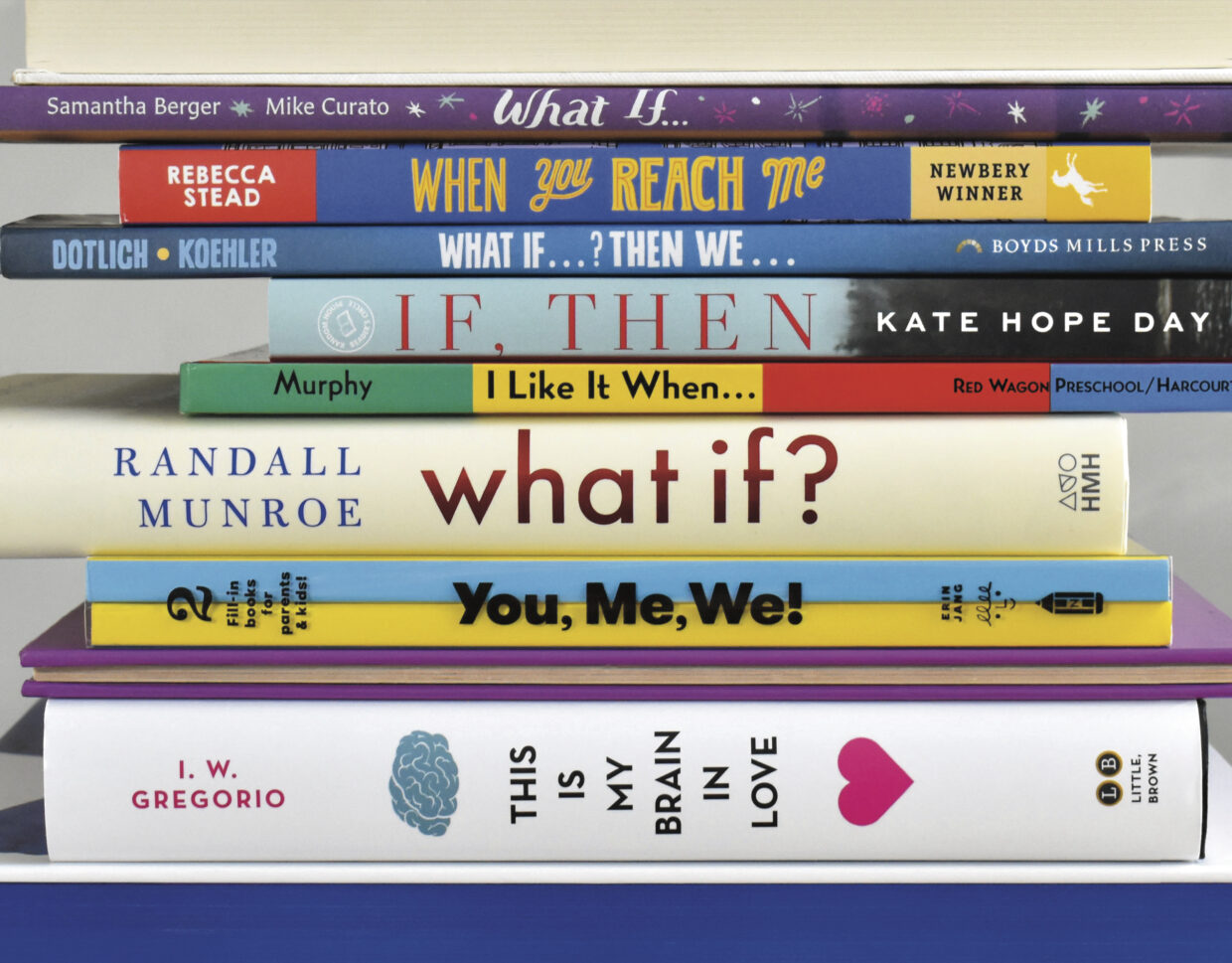
Love and Romance
What If…
When You Reach Me
What If…? Then We…
If, Then
I Like It When…
What If?
You, Me, We!
This Is My Brain in Love
· “She felt the essence of herself pulled finer and smaller like those streams of spun glass that pull and stretch till there remains but a glimmering illusion. Neither falling nor breaking, the stream spins finer. She felt herself very small and ecstatic. Alabama was in love.” –Zelda Fitzgerald, Save Me the Waltz, 1932
· Rebecca Stead’s When You Reach Me won the 2010 Newbery Medal for the most outstanding contribution to children’s literature. The book was inspired by and had ties to a book that won the 1963 Newbery Medal, Madeline L’Engle’s A Wrinkle in Time.
· On her website and in her TED Talks, Dr. Helen Fisher, biological anthropologist, senior research fellow at the Kinsey Institute at Indiana University, and author of 2005’s Why We Love: The Nature and Chemistry of Romantic Love, says humans are wired for love. Brain scans by Fisher and her colleagues show that increased levels of dopamine and oxytocin create feelings of attraction and attachment, while higher levels of testosterone and estrogen tend to shut off the part of the brain that controls rational behavior. Meanwhile, serotonin levels drop, comparable to levels seen in those with obsessive-compulsive disorder. You feel as if, Fisher says, “someone is camping in your head.”
Titles by: Samantha Berger and Mike Curato / Rebecca Stead / Rebecca Kai Dotlich and Fred Koehler / Kate Hope Day / Mary Murphy / Randall Munroe / Erin Jang / I. W. Gregorio
*
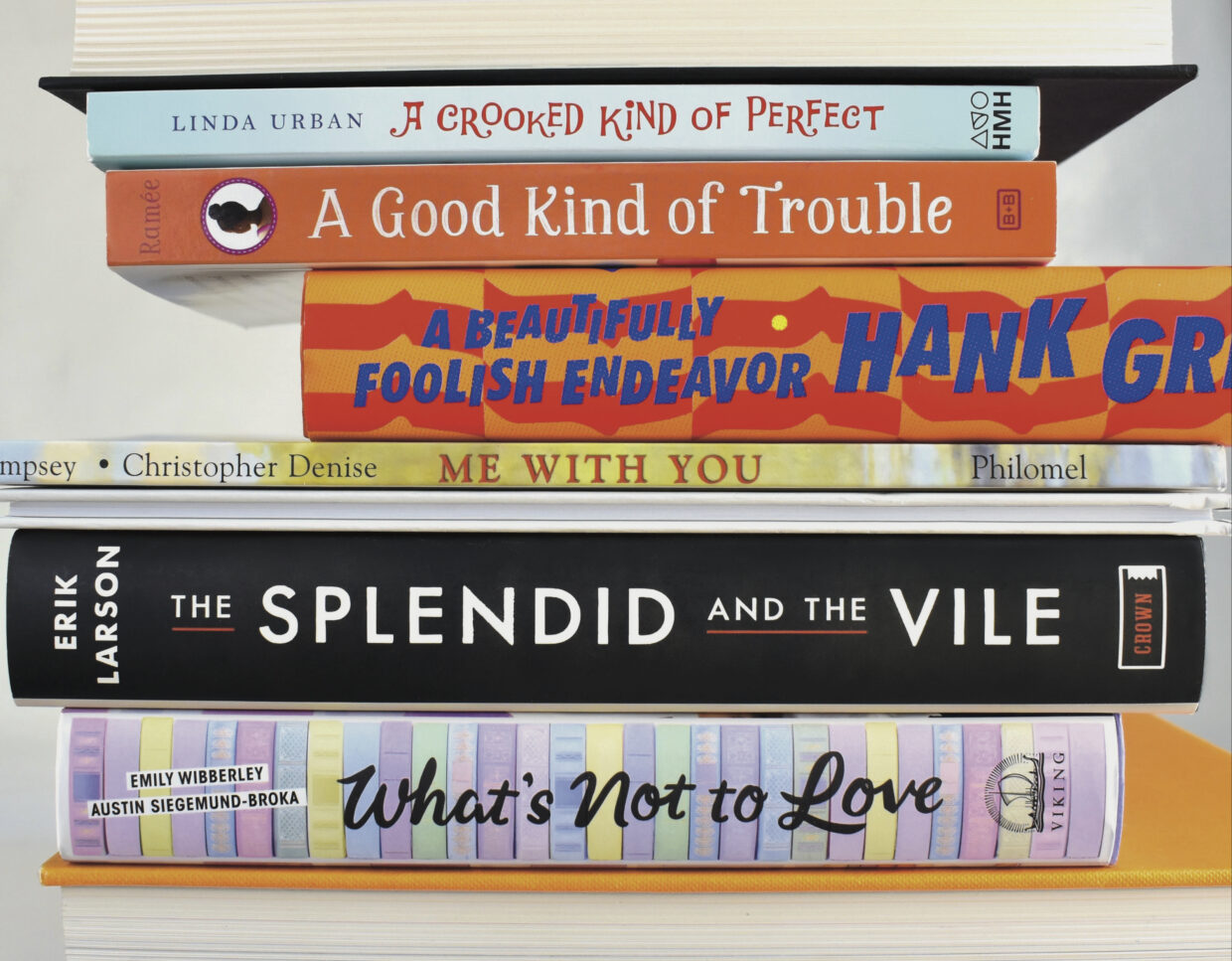
Love and Romance
A Crooked Kind of Perfect
A Good Kind of Trouble
A Beautifully Foolish Endeavor
Me with You
The Splendid and the Vile
What’s Not to Love
· “I may be heaven-sent, but I’m not perfect.” –Cynthia Leitich Smith, Eternal, 2009
· “It will never be perfect, but perfect is overrated. Perfect is boring.” –Tina Fey, Bossypants, 2011
· Before the toymaker Kohner launched the board game Trouble in 1965, they’d called it Frustration. Trouble is based on an early twentieth-century German game similar to Parcheesi with a name that loosely translates to “Don’t Argue.” During World War II, brothers Paul and Frank Kohner fled Czechoslovakia to America to escape the Nazis—Paul first, in 1940, and then Frank, in 1942. They formed Kohner Bros. in New York City, manufacturing wooden beaded purses before switching to toys. After World War II, when plastic became available and cheap, Paul Kohner commissioned engineer Albert Stubbmann to convert the toy factory from wood to plastic production. Stubbmann’s name is on more than twenty patents for at least fifty products, including the Pop-O-Matic dice device in the center of the Trouble board. Fred Kroll’s obituary of August 6, 2003, credits him with the creation of Trouble, as well as the 1970s game Hungry Hungry Hippos. Trouble was eventually acquired by Milton Bradley, which was bought by Hasbro in 1984.
· Erik Larson’s history The Splendid and the Vile: A Saga of Churchill, Family, and Defiance During the Blitz uses diaries and public records to follow British prime minister Winston Churchill and his advisers through his first year of leadership, during the Nazi World War II bombing campaign from May 1940 through May 1941.
Titles by: Linda Urban / Lisa Moore Ramée / Hank Green / Kristy Dempsey and Christopher Denise / Erik Larson / Emily Wibberley and Austin Siegemund-Broka
*
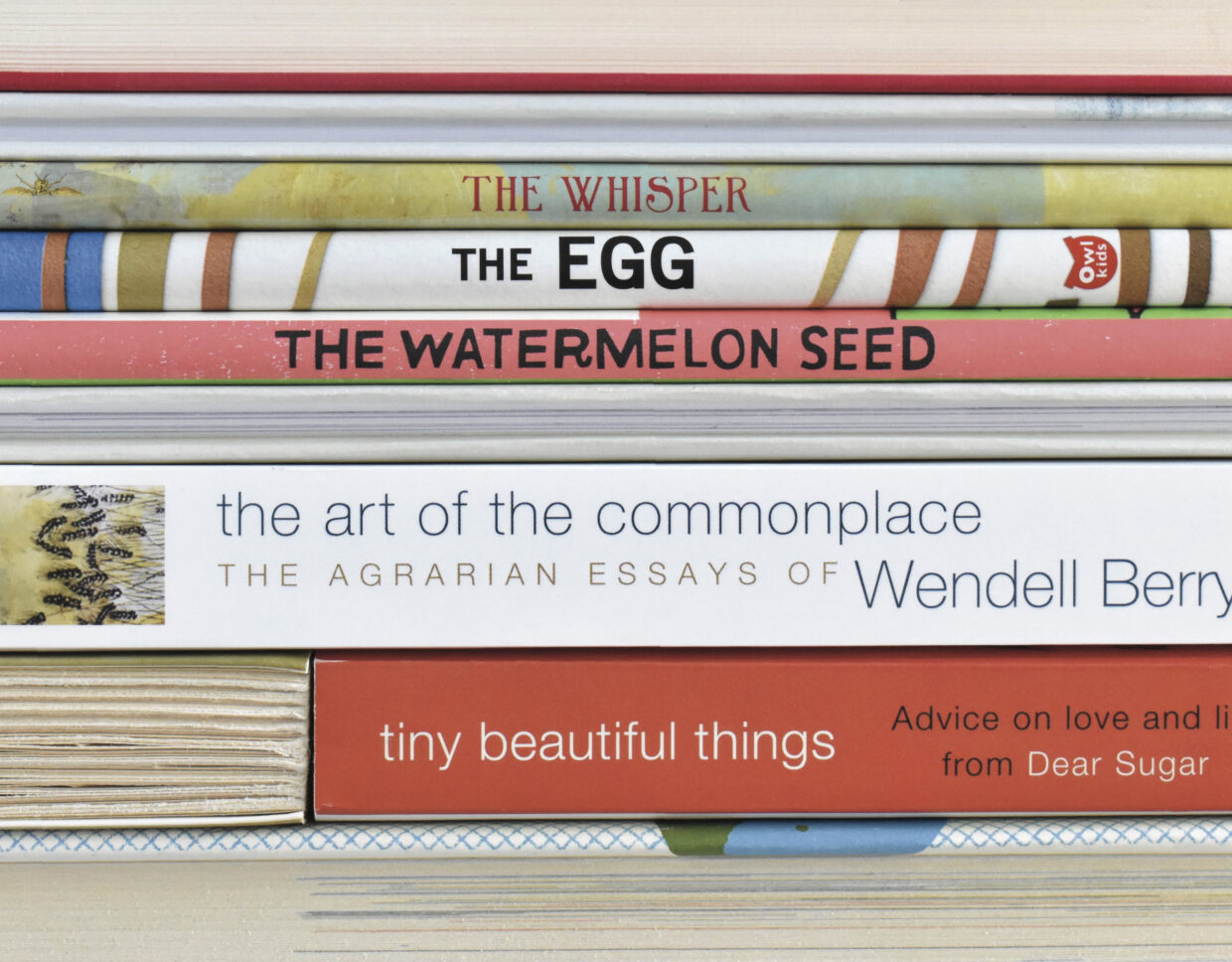
Art
The Whisper
The Egg
The Watermelon Seed
The Art of the Commonplace
Tiny Beautiful Things
· “PAY ATTENTION TO WHAT YOU PAY ATTENTION TO.” –Amy Krouse Rosenthal, @missamykr, March 15, 2013
· “Such as, for example: a gaggle of children trudging through a side-blown December flurry; a friendly match-share beneath some collision-tilted streetlight; a frozen clock, bird-visited within its high tower; cold water from a tin jug; toweling off one’s clinging shirt post–June rain. Pearls, rags, buttons, rug-tuft, beer-froth. Someone’s kind wishes for you; someone remembering to write; someone noticing that you are not at all at ease.” –George Saunders, Lincoln in the Bardo, 2017
· “She was like that, excited and delighted by little things, crossing her fingers before any remotely unpredictable event, like tasting a new flavor of ice cream, or dropping a letter in a mailbox.” –Jhumpa Lahiri, Interpreter of Maladies, 1999
· Cheryl Strayed wrote the essays in Tiny Beautiful Things as an unpaid advice columnist for the online literary magazine The Rumpus, under the pseudonym “Sugar.” When she stopped writing the column in 2012, she revealed her identity as the author of the bestselling memoir Wild: From Lost to Found on the Pacific Crest Trail. While hiking the Pacific Crest Trail, Strayed brought along “an old friend,” Adrienne Rich’s The Dream of a Common Language.
Titles by: Pamela Zagarenski / Geraldo Valério / Greg Pizzoli / Wendell Berry / Cheryl Strayed
*
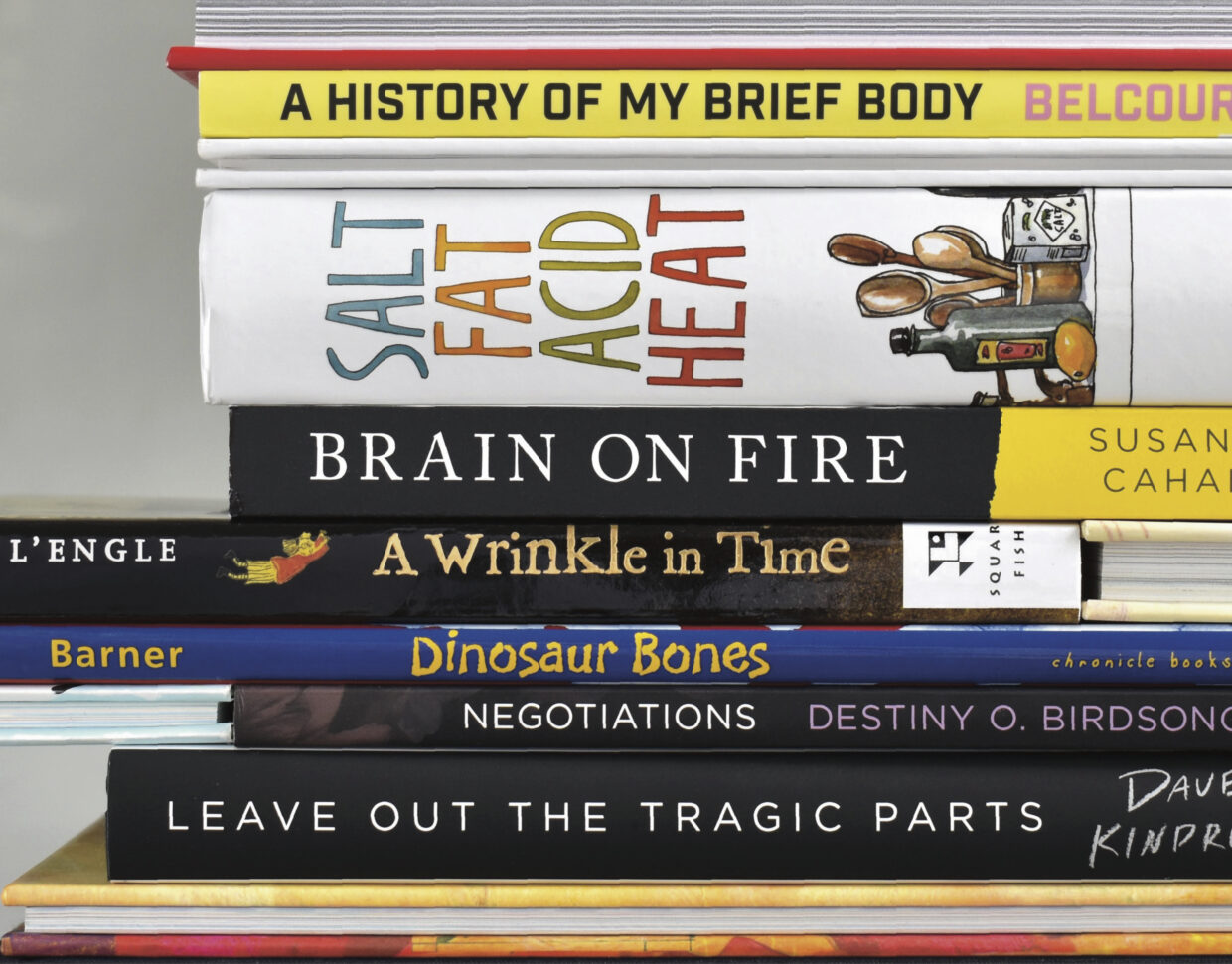
Biography and Memoir
A History of My Brief Body
Salt Fat Acid Heat
Brain on Fire
A Wrinkle in Time
Dinosaur Bones
Negotiations
Leave Out the Tragic Parts
· “I’ve finally recognized my body for what it is: a personality-delivery system, designed expressly to carry my character from place to place, now and in the years to come.” –Anna Quindlen, Lots of Candles, Plenty of Cake, 2012
· Madeleine L’Engle’s A Wrinkle in Time was rejected by twenty-six publishers who’d claimed it was too difficult and detailed for children before Farrar, Straus and Giroux published it in 1962. In 1963, the book won the Newbery Medal for Distinguished Literature for Children.
· A Wrinkle in Time begins “It was a dark and stormy night,” as does every novel typed by the character Snoopy in Charles Schulz’s Peanuts comic strip. Both L’Engle and Schulz chose the opening sentence from the 1830 novel Paul Clifford by Edward Bulwer-Lytton because the phrase exemplified bad writing.
· The line is commemorated annually in the Bulwer-Lytton Fiction Contest for the worst first sentence of a nonexistent novel. According to the contest’s website, founder Dr. Scott Rice later learned that “the line had been around for donkey’s years before Lytton decided to have fun with it but the damage had been done…and rendered [Bulwer-Lytton’s] name synonymous with bad writing, an author more widely read in his time than Charles Dickens.”
· Charles Dickens was Bulwer-Lytton’s editor and friend. He named one of his sons, Edward Bulwer Lytton Dickens, after him.
· Bulwer-Lytton is also credited with the phrase “The pen is mightier than the sword,” a line spoken by Cardinal Richelieu in Bulwer-Lytton’s 1839 play Richelieu: Or, The Conspiracy, A Play in Five Acts. The cleric discovers there are plans to murder him, but is unable to respond with violent measures because of his calling.
Titles by: Billy-Ray Belcourt / Samin Nosrat and Wendy MacNaughton / Susannah Cahalan / Madeleine L’Engle / Bob Barner / Destiny O. Birdsong / Dave Kindred
*
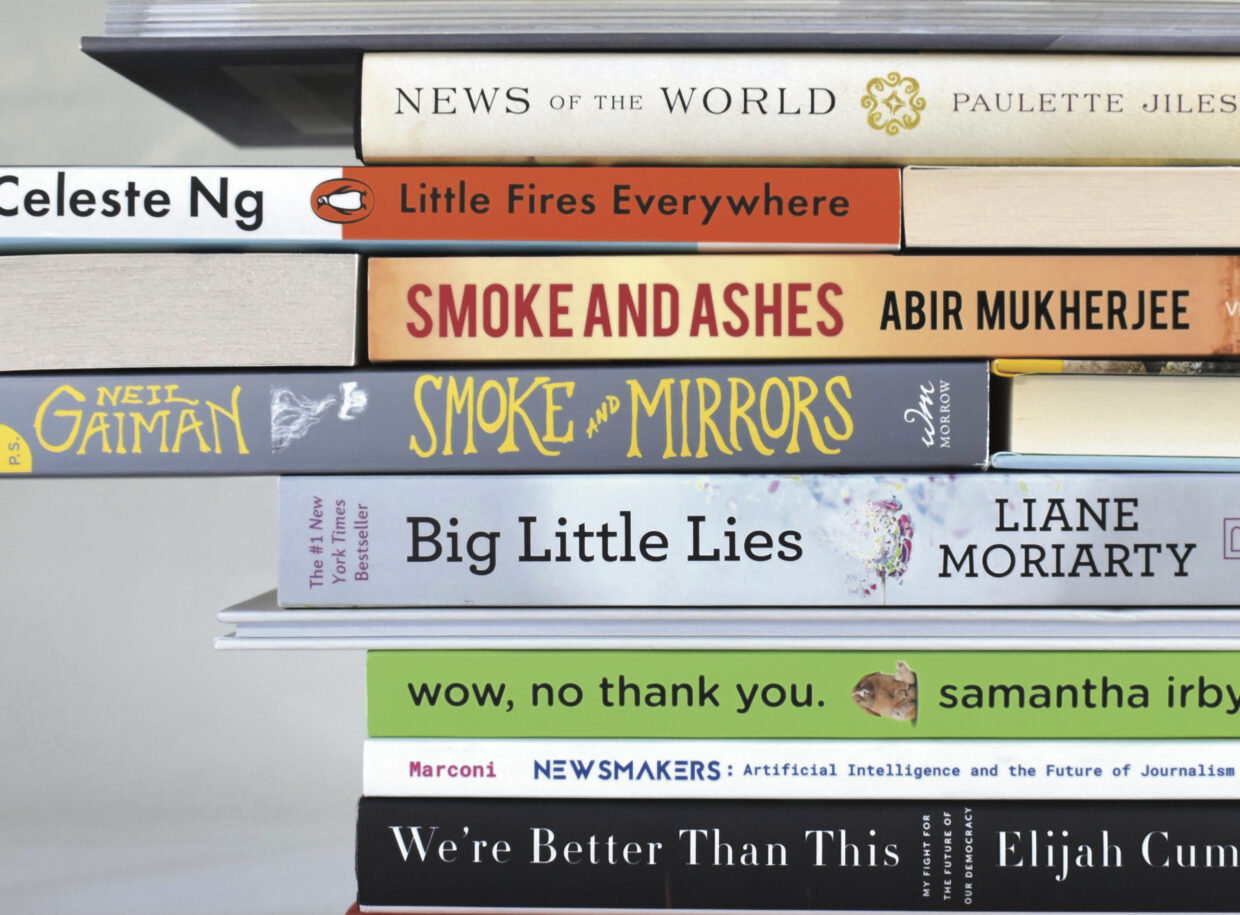
Politics, History, and Current Events
News of the World
Little Fires Everywhere
Smoke and Ashes
Smoke and Mirrors
Big Little Lies
Wow, No Thank You.
Newsmakers:
We’re Better Than This
· “But we must tell our stories, and not be ensnared by them.” –Ta-Nehisi Coates, The Water Dancer, 2019
· “People have a right to their own opinions, but not to their own facts.” –James W. Loewen, Lies My Teacher Told Me: Everything Your American History Textbook Got Wrong, 1995
· “Lies, my dear boy, are found out immediately, because they are of two sorts. There are lies that have short legs, and lies that have long noses. Your lie, as it happens, is one of those that have a long nose.” –Carlo Collodi, The Adventures of Pinocchio, 1883
· “Of course we do have this saying, ‘He lies like an eyewitness.’” –Dmitri Shostakovich, Testimony: The Memoirs of Dmitri Shostakovich, as Related to and Edited by Solomon Volkov, 1979. Julian Barnes chose this quote by Russian composer Shostakovich for the epigraph of his 1991 novel about three Londoners, Talking It Over. A wife, her husband, and the husband’s old friend tell the same story from three different perspectives—their own.
· “Liar, liar! Pants on fire!” So far, origin stories of the playground expression—including one that it came from a poem called “The Liar,” attributed to William Blake—have been found to be false, and the creator of the phrase is yet unknown. Linguist Barry Popik says the expression was in use well before the 1920s. A June 2010 entry in etymology blog, The Big Apple, notes a version in the February 13, 1922, Chicago Daily Tribune, “under the heading ‘Do You Remember Way Back When’: We children used to shout: You liar! You liar! Your pants are afire. Your tongue is as long as a telegraph wire.’”
Titles by: Paulette Jiles / Celeste Ng / Abir Mukherjee / Neil Gaiman / Liane Moriarty / Samantha Irby / Francesco Marconi / Elijah Cummings with James Dale
__________________________________
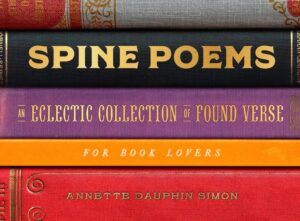
Excerpted from Spine Poems: An Eclectic Collection of Found Verse by Annette Dauphin Simon. Copyright © 2022. Available from Harper Design, an imprint of HarperCollins Publishers.



